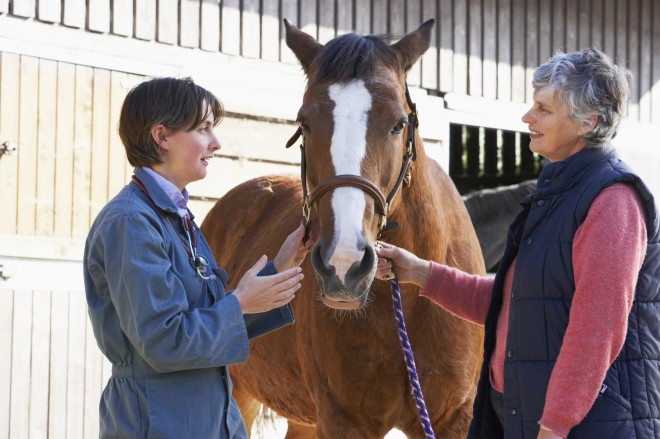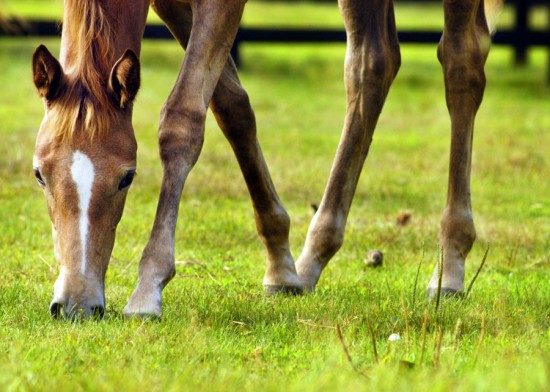
1. Feed them the wrong food.
Whenever you go to the supermarket, you’ll notice there are shelves and shelves of dog food. Have you ever read the labels on the bags of dog food? Are the dog foods available from your vet really better, or are they just more expensive?
Choosing the right food for your dog is important. Feeding an inappropriate food may lead to low energy levels, reduced immune system, infertility, loose stools and a dull coat.
What makes a dog food a good food?
An important difference between foods is the source of its protein content. Animal protein such as lamb or chicken has a better balance of amino acids for your dog, so food containing more animal protein is a much better choice. However, animal protein is also more expensive than plant protein, so these foods will cost you more. You can bet your bottom dollar that a cheap dog food contains cheap ingredients, and while it will keep your dog alive, he won’t be the best he can be on it.
Fat is another very important nutrient for dogs. It’s involved in vitamin metabolism, and fatty acids contribute to a shiny coat and healthy skin. It’s also the prime energy source for dogs. Unlike us, they don’t depend on carbohydrates for energy, so the carbohydrate content of the food isn’t critical.
To sum up, choose a food that contains at least 18% protein, around 5% fat, and has animal protein in the top two or three positions of the ingredient list. There will be many foods that meet these criteria, so choose one that fits your budget, and that your dog enjoys. Don’t forget to add regular raw meaty bones to keep their teeth clean.
2. Feed them too much food.
At the moment, statistics indicate that up to 40% of dogs are overweight. While many people think giving their dogs a treat or a titbit is showing them affection, if they do it too much they are actually shortening their lifespan and predisposing them to illness and injury.
Overweight dogs are at increased risk of heart disease, arthritis, diabetes, pancreatitis and skin fold infections.
It’s easiest not to let your dog become overweight in the first place. When you are feeding your dog, you can certainly be guided by the recommendations on the package, but you don’t need to stick to it. If your dog isn’t very active, it’s not going to need as much energy as a dog who runs with their owner several times a week, so the unused protein, fat and carbohydrates is stored in the body as fat. In my experience, many of the premium dry dog foods overestimate how much to feed your dog.
How much do you feed your dog? Basically, feed your dog to condition. Decide what you’re going to feed him, start with the suggestion on the packet and watch him over the following weeks or months. If he’s getting rounder, cut back. If he continues to get rounder, cut back further. If he’s looking good with ribs you can feel and a tucked up abdomen, then you’re feeding enough to meet his energy requirements with nothing left over to be converted to fat.
If your dog is already overweight, you need to tackle this in two ways. Firstly, reduce the amount of calories he’s eating. Either cut back on the quantity of food he’s getting, or choose a food with fewer calories. There is the option of using a prescription weight loss diet from your vet and these work very well.
Secondly, increase the energy your dog uses in a day by increasing his exercise. Take him for a walk or a jog, let him run at the dog park or take him to the beach. If your dog is a bit heavy, then weight bearing exercise may be uncomfortable for him, and he may enjoy a swim at a hydrotherapy complex, or a walk on an underwater treadmill. This can allow him to exercise while the water helps to support his bodyweight.
Overfeeding your dog can not only lead to ill health, but it may also shorten your dog’s lifespan. A recent study over 14 years suggested that dogs fed a restricted amount of food lived on average 15% longer than their littermates fed a regular quantity of food.
3. Wash their dogs too often with the wrong products.
I often have people come into my practice and apologise because they haven’t bathed their dog in a few weeks. In my mind, that’s great.
When it comes to normal healthy dogs with no skin allergies or sensitivities, they really don’t need bathing much at all. I personally bath my dogs maybe once a year, if that. I’m sure that horrifies a lot of people, but my dogs have clean healthy coats, and don’t smell at all. They live inside my house and while they do shed a bit of hair, they don’t leave any dirt around.
Dogs have natural oils in their coat which repel dirt. If you shampoo your dog too often, these natural oils are removed and the coat no longer keeps itself clean. You then tend to wash again, and the cycle continues.
What about that doggie smell? In my experience, doggie smell is related to less than healthy skin and coat. Skin health relies primarily on a quality diet, and also on external parasite control. A poor diet with deficiencies particularly in protein and essential fatty acids will lead to a dull dry coat. The presence of fleas may lead to itching and scratching, which can allow the normal bacteria and fungi on the skin to multiply. Feeding your dog a quality food and controlling fleas will go a long way to reducing doggy odor.
Washing your dog frequently will also reduce the effectiveness of many of the topical flea control products.
If you really must bath your dog regularly, choose a mild shampoo which is soap free, to avoid removing too much skin oil. Try and leave it at least monthly between baths to get the best results from your topical flea control.
I always consider ear care to be part of skin and coat care, because the skin lining the ear canal is very similar to the skin on the body. If your dog doesn’t have any ear problems, and there is no excessive discharge or ear wax, then there really isn’t any need to clean them. My advice is to leave well enough alone. If you start adding cleaners to healthy ears, you may upset the natural balance of bacteria and fungi in the ear and allow them to multiply, causing infection. In 22 years of owning dogs, I have never cleaned any ears, and I have had one brief incidence of ear infections.
Dogs with allergies, infections or other sensitivities may need medicated baths and regular ear treatment as part of the management of their condition, and this should be discussed with your veterinarian.
4. Don’t take steps to avoid behavior problems
Did you know that behavior problems are one of the commonest reasons dogs are euthanised? In many cases, no training, poor leadership and boredom are responsible for this.
When you get your puppy, he’s so cute and it’s easy to forgive him when he’s naughty. However, naughty puppies grow into naughty adults, and will it be so easy to forgive when fully grown? It’s imperative that you start as you mean to finish. If you don’t want your 100lb Great Dane on the couch, don’t let him up when he’s a baby. If you don’t want your adult Rottweiler jumping up for a cuddle, teach him to sit while he’s young.
One of the best things you can do for your pup is to enroll in puppy classes, to start to teach good manners and obedience, and also to allow him to mix with other dogs and people. Correct socialization will allow your dog to grow up into a friendly companion you can take anywhere without him being afraid or aggressive. Puppy classes will also help you to start to establish yourself as pack leader.
If you’re at work during the day, your dog may be bored and lonely and cause a bit of trouble. This is often when dogs bark, dig, and pull washing off the line. Dogs are a pack animal and aren’t used to living a solitary life. If you aren’t home a lot, your dog may be happier with another dog as a companion. However, be sure you can afford the care and feeding of two dogs before you bring home another pet.
There are lots of products available on the market to help alleviate boredom while your dog is alone. Kongs, Buster Cubes and similar items can make your dog’s day a bit more pleasant.
Another great option is doggy day care, where dogs can play and mix with other dogs while you’re at work. They will come home tired and happy, and are much less likely to have behavioral problems.
Don’t wait until a behavioral problem develops; by then it may be too late and quite costly to remedy. Take steps as soon as you get your dog to shape him into a companion who will enrich your life, not add stress to it.
5. Don’t take the basic steps to prevent illness in their dog.
Let’s face it; we all know that the purchase price is the cheapest part of owning a dog. The costs are ongoing – food, vet visits, neutering… it all adds up.
It’s really important that a dog owner takes basic steps to keep their dog healthy. Yes, it will cost a little, but it will definitely save in the long term by preventing illness and avoiding the expense of veterinary treatment.
So, what are the basics?
We’ve already discussed the benefits of a quality diet, so you understand how to choose a good dog food. Similarly, we’ve mentioned that you don’t need to bath frequently, so you don’t need to spend money on shampoos.
Vaccinations against viral diseases can help prevent your dog becoming seriously ill. For example, parvovirus can cause a severe gastroenteritis with vomiting and bloody diarrhea. Affected dogs can spend quite a long time in hospital on intravenous fluids. Regular vaccinations as prescribed by your vet can avoid this scenario. How often to vaccinate depends on many factors, including your dog’s level of immunity, the risk of exposure and the type of vaccine used. Be guided by your vet when choosing a vaccination schedule for your dog.
Flea control is an essential part of dog care. There are lots of choices and there will be one that suits your lifestyle and budget. Fleas transmit tapeworms, can cause skin inflammation and allergies, and may drink so much blood they cause anemia. Controlling fleas depends on not only killing fleas on your dog, but controlling them in the environment where they breed.
Internal parasites can make your dog ill. Regular worming against intestinal worms can prevent anemia (hookworms), diarrhea (roundworms and tapeworms), colitis (whipworms) and general poor health and ill thrift. Speak to your vet about a worming schedule for your dog, as it can vary depending on the age of your dog and the product you choose. Heartworm disease is deadly, and is spread by mosquitos. There are some areas where mosquitos aren’t a problem, or they only occur in certain times of the year, so you may find you don’t need to use year round heartworm prevention. However in some parts of the world, dogs need to be on heartworm prevention all the time. If your dog isn’t on prevention or you’ve missed some tablets, you will need to have him tested before starting preventatives again.
If you’re not a registered breeder, neuter or spay your dog. Your dog may be the cutest dog in the world and he’d have beautiful puppies, but genetics can be a gamble and his pups may not take after him. Also, your dog’s breed may have genetic issues that need to be tested for before breeding. Neutering your male dog can help prevent prostate disease, it will definitely prevent testicular cancer, and it can help avoid some behavior problems such as aggression or wandering. Spaying your female can reduce the risk of breast cancer and will eliminate the chance of a serious infection of the uterus known as pyometron.
Check your dog’s teeth regularly. Dental disease has been associated with heart disease, joint disease and reduced immunity. Regular raw meaty bones will help keep your dog’s teeth clean. However, some dogs just won’t eat bones and in this case, it would be a good idea to regularly give your dogs teeth a brush with a soft toothbrush. If necessary, you can have your vet clean your dog’s teeth under anesthesia with an ultrasonic scaler.
You may look at this list and think, gosh, what an expensive list. However, it’s not as bad as it looks – neutering is a once off expense, and vaccination is no more than once a year and may be less frequent. Good nutrition, raw bones and parasite control are small but regular expenses, but they can all help prevent a huge expense at a later date. Not only that, but they will keep your dog in the best of health.
 Why Do Small Dogs Develop Pyloric Stenosis And Pylorospasm?
Why Do Small Dogs
Why Do Small Dogs Develop Pyloric Stenosis And Pylorospasm?
Why Do Small Dogs
 Common Diseases Of Aquatic Turtles
Common Diseases O
Common Diseases Of Aquatic Turtles
Common Diseases O
 6 Signs Of Sacroiliac Disease In Horses
6 Signs Of Sacroi
6 Signs Of Sacroiliac Disease In Horses
6 Signs Of Sacroi
 Lumpy Legs - Common Conditions Of The Equine Limb
Lumpy Legs - Comm
Lumpy Legs - Common Conditions Of The Equine Limb
Lumpy Legs - Comm
 Six Situations That Might Mean Your Cat Would Be Better As An Indoor-only Pet
Six Situations Th
Six Situations That Might Mean Your Cat Would Be Better As An Indoor-only Pet
Six Situations Th
Copyright © 2005-2016 Pet Information All Rights Reserved
Contact us: www162date@outlook.com